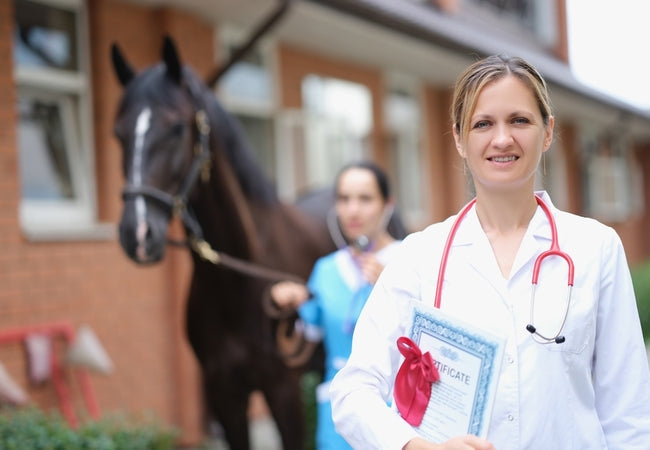Horse Health Certificates 2025: Veterinary Guide 🩺🐴

In this article
Horse Health Certificates 2025: Veterinary Guide 🩺🐴
By Dr. Duncan Houston BVSc
Hello! I’m Dr Duncan Houston, BVSc, veterinarian and founder of Ask A Vet. If you're moving, competing, or boarding your horse out of state (or internationally), a valid Certificate of Veterinary Inspection (CVI), commonly called a health certificate, is essential. In 2025, the process is streamlined, but you still need timely exams, accurate testing, and thorough paperwork. This article explains what a CVI covers when it’s required, how to get one, validity and cost, plus how Ask A Vet can support your prep and follow-up. Let’s ensure smooth travels and peace of mind! 🐎✨
1. ✅ What Is a Horse Health Certificate (CVI)?
A CVI is a legal document, signed by a USDA-accredited veterinarian or equivalently authorised professional, attesting that your horse was physically examined—generally within 10–30 days—and found free of infectious disease.
- Includes horse ID, exam date, veterinarian’s accreditation, and signature.
- Often incorporates results from the negative Coggins test (Equine Infectious Anemia).
- May list required vaccinations or tests depending on event or destination (eg, piroplasmosis, influenza).
2. 🗓️ When Is a CVI Required?
You need a CVI in the following scenarios:
- Interstate travel: Any cross-state transport.
- International export: For border crossing, export paperwork.
- Shows, competitions, sales & some boarding stables Often require health certificates, Coggins, and vaccinations.
- Change of brand/state law: Some states (like Washington) require brand inspections on CVIs.
3. 🔬 Tests & Requirements
3.1 Coggins Test (EIA)
All horses traveling interstate must have a valid, negative Coggins test, usually performed within the last 6–12 months. States may also require proof of negative tests for equine piroplasmosis or other diseases.
3.2 Physical Exam
The veterinarian will examine:
- Temperature, heart, lungs, general demeanour
- Teeth, gums, hydration, lameness signs
- Presence of swelling, wounds, and nasal discharge.
3.3 Additional Tests & Vaccinations
- Some shows require proof of equine influenza (EHV-1, encephalitis, rabies, tetanus.
- International travel often requires USDA-endorsed certificates, disease-specific tests, and vaccination records.
4. 🕒 Validity & Timing
- Typically valid for 30 days after issuance.
- Some states/event programs may shorten validity to 5–10 days.
- Extended “EECVIs” covering multiple trips may be issued for six months where regulations allow.
- If multiple state stops are planned, check whether separate CVIs are needed.
5. 💰 Costs & Fees
The price for a horse health certificate depends on region, vet time, and paperwork complexity:
- USDA-accredited exam/CVI only: $15–45 on average.
- Coggins test: $20–70 lab fee.
- USDA-endorsed international CVI: Includes accreditation, endorsement fees, shipping/administration—often extra $20–50+.
- Multiple-state CVIs or disease-specific tests: Additional costs for lab testing or endpoint paperwork.
6. 📝 Preparing to Get a CVI
- Schedule a Coggins test well before travel to avoid lab delays.
- Share travel dates, destinations, stopovers, and event requirements with your vet.
- Gather IDs: registration, microchip, brand, marking photos.
- Confirm specific destination regulations (their vaccine, brand certificate, EECVI, etc.).
- Ask if your vet issues digital CVIs (easier), otherwise plan for physical endorsement and mailing.
7. 🛡️ Tips to Avoid Issues
- Present negative Coggins early—don’t wait till the last minute.
- Check state-specific CVI requirements before travel.
- Ensure authorized USDA endorsement for international travel.
- Use GlobalVetLink or similar EECVI platforms for accurate and timely paperwork.
- Keep physical and digital copies with you during travel—including stopovers.
8. 🧩 Ask A Vet Support
- Ask A Vet: Telehealth consults before travel—confirm tests needed, connect vet with regulations, assist with paperwork issues during the journey.
9. 📝 Final Thoughts
In 2025, the horse health certificate (CVI) remains the cornerstone of equine movement safety—for interstate travel, export, shows, and facility boarding. Ensuring timely exams, correct testing, and accurate paperwork helps you avoid fines, delays, and health risks. With careful planning, vet coordination, and digital tools like Spirit Ask A Vet, the process can be streamlined and stress-free. Ready to haul or compete? Start early, know the requirements—and focus on what you love most: time with your horse. 🐎💙






